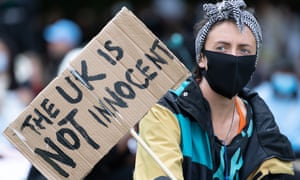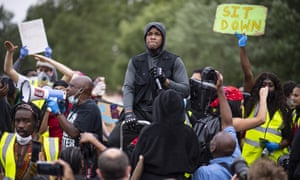
Demonstrator at a Black Lives Matter protest on 6 June 2020 in Cardiff. Photograph: Matthew Horwood/Getty Images
One of the more pertinent statements made during this past extraordinary week appeared in one of the last places I would have thought to look – in the pages of Vogue, not a publication I instinctively turn to at a moment of profound political tension.
“Racism is a global issue. Racism is a British issue. It is not one that is merely confined to the United States – it is everywhere, and it is systemic,” wrote Edward Enninful, the editor-in-chief of the magazine’s British edition. The ubiquity of racism has been brought to stark and sudden attention by the killing of George Floyd and by the unprecedented wave of protests, demonstrations and rioting that followed.
Filmed by many witnesses and now viewed millions of times, the killing of Floyd by a Minnesota policeman, a 21st-century lynching, is so sickening a crime that the revulsion it has induced has become a global phenomenon.
The demonstrators and activists who have taken to the streets have, however, been motivated by more than revulsion. They have also been stirred to action by acknowledging a fundamental truth – that the killing of Floyd has to be understood as a symptom of systemic racism. By building their campaign around that reality they have promoted radical and challenging conversations – in countries on both sides of the Atlantic – about the nature of racism and the actions that people of all races can take in eliminating it. These are conversations that we have needed for a very long time.
Led by young people, many of them inspired by Black Lives Matter, and involving people of all ethnicities, the protests have morphed into a worldwide anti-racist movement. No longer is this moment solely about police violence nor is it limited to America. Both online and on the streets it is calling out racism, wherever it exists and in whatever forms it is found. In both the US and in Europe, people are asking, tentatively, if this might be a defining moment of change.
One of the more pertinent statements made during this past extraordinary week appeared in one of the last places I would have thought to look – in the pages of Vogue, not a publication I instinctively turn to at a moment of profound political tension.
“Racism is a global issue. Racism is a British issue. It is not one that is merely confined to the United States – it is everywhere, and it is systemic,” wrote Edward Enninful, the editor-in-chief of the magazine’s British edition. The ubiquity of racism has been brought to stark and sudden attention by the killing of George Floyd and by the unprecedented wave of protests, demonstrations and rioting that followed.
Filmed by many witnesses and now viewed millions of times, the killing of Floyd by a Minnesota policeman, a 21st-century lynching, is so sickening a crime that the revulsion it has induced has become a global phenomenon.
The demonstrators and activists who have taken to the streets have, however, been motivated by more than revulsion. They have also been stirred to action by acknowledging a fundamental truth – that the killing of Floyd has to be understood as a symptom of systemic racism. By building their campaign around that reality they have promoted radical and challenging conversations – in countries on both sides of the Atlantic – about the nature of racism and the actions that people of all races can take in eliminating it. These are conversations that we have needed for a very long time.
Led by young people, many of them inspired by Black Lives Matter, and involving people of all ethnicities, the protests have morphed into a worldwide anti-racist movement. No longer is this moment solely about police violence nor is it limited to America. Both online and on the streets it is calling out racism, wherever it exists and in whatever forms it is found. In both the US and in Europe, people are asking, tentatively, if this might be a defining moment of change.

FacebookTwitterPinterest The British actor John Boyega speaks to the crowd during a Black Lives Matter protest in Hyde Park on 3 June 2020 in London, England. Photograph: Justin Setterfield/Getty Images
Yet in the immediate aftermath of Floyd’s death there was little reason to imagine anything would be any different this time around. For African Americans, one of the most appalling aspects of Floyd’s murder was that they had seen it all before. The same story with the same outcome, all that changed was the name of the victim – Ahmaud Arbery, Breonna Taylor, Sandra Bland, Tamir Rice, Philando Castile, Walter Scott.
For many black Britons, Floyd’s death stirred memories of another list of names, those of the members of their community killed or rendered disabled in similar circumstances at the hands of the British police or immigration officers. On Tuesday, the Black Cultural Archives in Brixton, south London – the closest thing we have in this country to a museum to the black British experience – tweeted the names and the photographs of some of them – Mark Duggan, Sheku Bayoh, Sean Rigg, Sarah Reed, Cherry Groce, Leon Briggs, Christopher Alder, Brian Douglas.
Yet almost instantly a predictable chorus of voices, emanating from predictable corners of British public life, rose up to dismiss the whole thing as an irrelevance. Using a familiar playbook, they accused those black Britons who see reflections of their own situation in the experiences of African Americans of making false comparisons.
The US situation is unique in both its depth and ferocity, they say, so that no parallels can be drawn with the situation in Britain. The smoke-and-mirrors aspect of this argument is that it attempts to focus attention solely on police violence, rather than the racism that inspired it. Those who make it usually point to the ubiquity of firearms in US law enforcement, as proof that the US reality is beyond meaningful comparison. But firearms had nothing to do with the killing of George Floyd. Neither were they a factor in the death of Freddie Gray or the sidewalk killing of Eric Garner, who, like Floyd, pleaded for his life, saying 11 times to the officers who pinned him down: “I can’t breathe”, the same words Floyd used in his final moments. Nor were guns involved in many of the cases when black people have died in custody or during arrest in Britain.
Excusing or downplaying British racism with comparisons to the US is a bad habit with a long history
When black Britons draw parallels between their experiences and those of African Americans, they are not suggesting that those experiences are identical. Few people would deny that in many respects life is better for non-white people in the UK than in the US. The problem is that it is not as “better” as some like to believe. Black men are stopped and searched at nine times the rate of white men. Black people make up 3% of the population of England and Wales but account for 12% of the prison population and not since 1971 have British police officers been prosecuted for the killing of a black man, and even then they were charged with the lesser crime of manslaughter and that charge was later dropped.
To say that the racism that infects parts of our police force and criminal justice system is less virulent than that which poisons the lives of 40 million African Americans is not much of a boast. Is that really the extent of our ambition – to be a somewhat less racist nation than one led by a man who describes white nationalists and members of the Ku Klux Klan as “very fine people”? Surely we who dwell in what the actor Laurence Fox recently assured us is “the most tolerant, lovely country in Europe” have higher hopes?
Excusing or downplaying British racism with comparisons to the US is a bad habit with a long history. It began in 1807, with the abolition of the slave trade and picked up steam three decades later with the end of British slavery, twin events that marked the beginning of 200 years of moral posturing and historical amnesia. The Victorian readers who rightly wept over Uncle Tom’s Cabin, for example, conveniently forgot which nation had carried his ancestors into slavery and didn’t dwell on the fact that most of the cotton produced by American slaves like him was shipped to Liverpool.
For two centuries, we have deployed American racism as a distraction. It’s as if we find it easier to recognise American forms of racism than we do our own home-grown varieties. Convenient, as pointing fingers is always more comforting than looking in the mirror.
The condition of Indian Dalit who stand discriminated by birth is no different. These hapless humans are reduced to bonded labour, indirect slavery. It's a sensitive
ReplyDeletematter of inhumanity amongst humans especially who are affluent, hold power - political and economic and directly influence desicion making in Government.